Abstract
The value of various prognostic factors in breast cancer patients has been determined in a number of studies. Few reports have been published on the dependence of treatment outcome on histological and immunohistochemical characteristics in the primary tumour in patients with metastatic disease. We studied the incidence and prognostic value of histological and molecular abnormalities in the primary tumour of patients who had developed metastatic breast cancer. Eligible patients received a fluorouracil, epirubicin and cyclophosphamide (FEC) regimen either once a week or once every 4 weeks. Adequate specimens for various analyses were available from 127 patients. Median follow-up time of the patients ranged from 15 to 101 months. In this study, the histological grade of the malignancy best predicted response to chemotherapy (P < 0.0005). Most of the responses were observed in patients with grade 1 tumours; in this group, time to progression was delayed. C-erb B-2 gene amplification and oncoprotein expression had no predictive value. Neither p53 nor cathepsin-D predicted treatment outcome after chemotherapy. None of the factors had an effect on overall survival. Among breast cancer patients who received anthracycline-containing chemotherapy, response to treatment correlated with histological grade. In patients with histological grade 1 breast cancer, the time to progression was longest. However, overall survival was not affected by histological grade nor the other parameters tested. In addition to histological grade, other prognostic factors that are not included in this study need to be identified to determine which patients with metastatic breast cancer would benefit from cytotoxic treatment.
Full text
PDF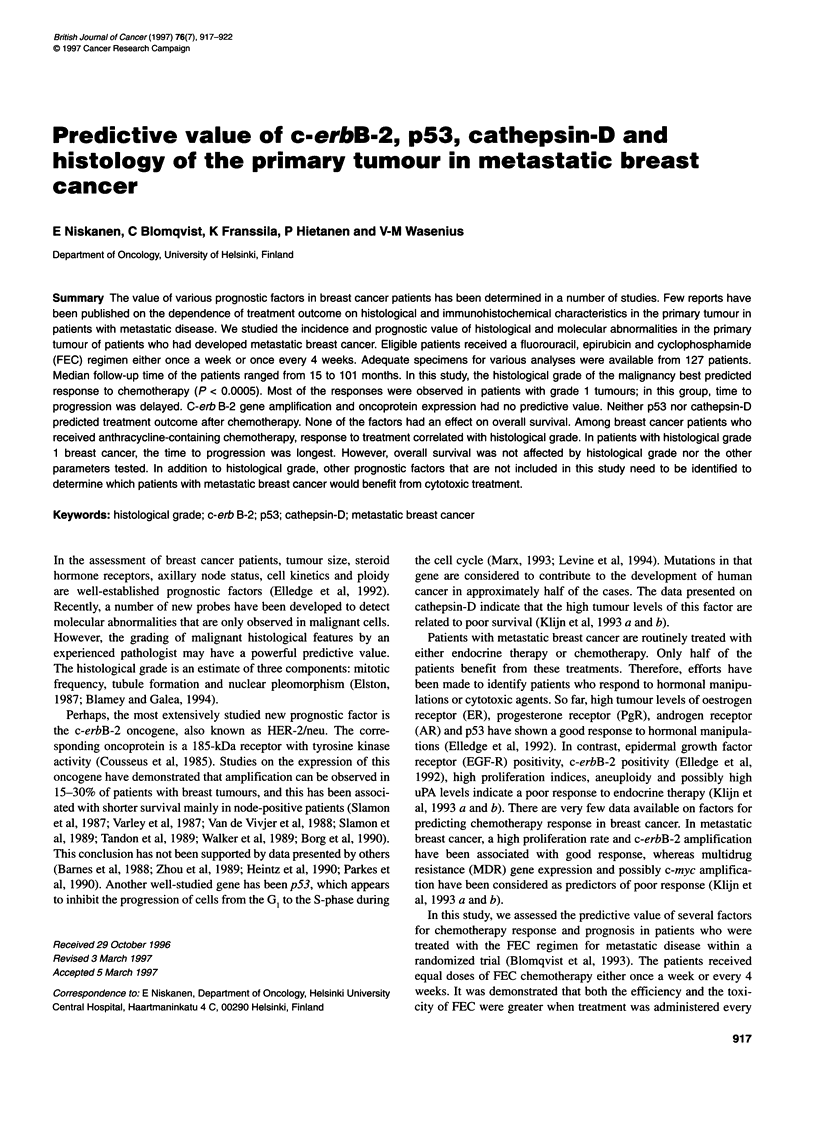
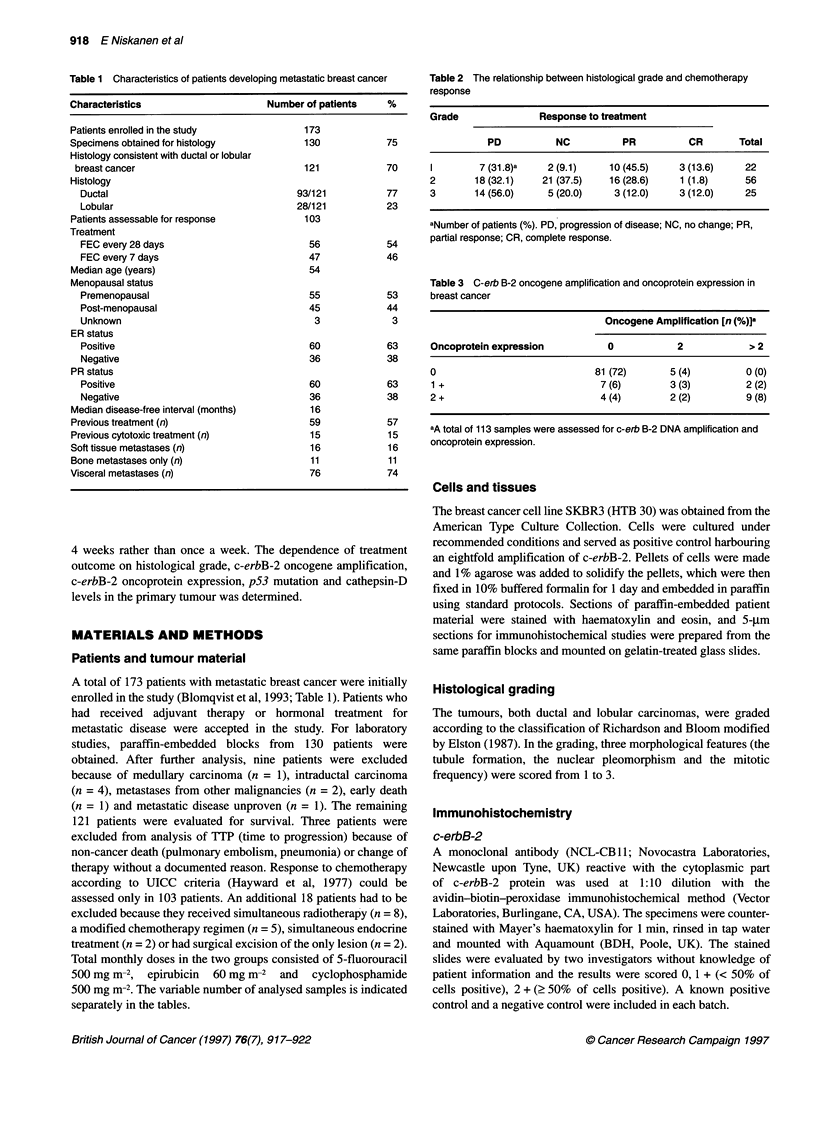
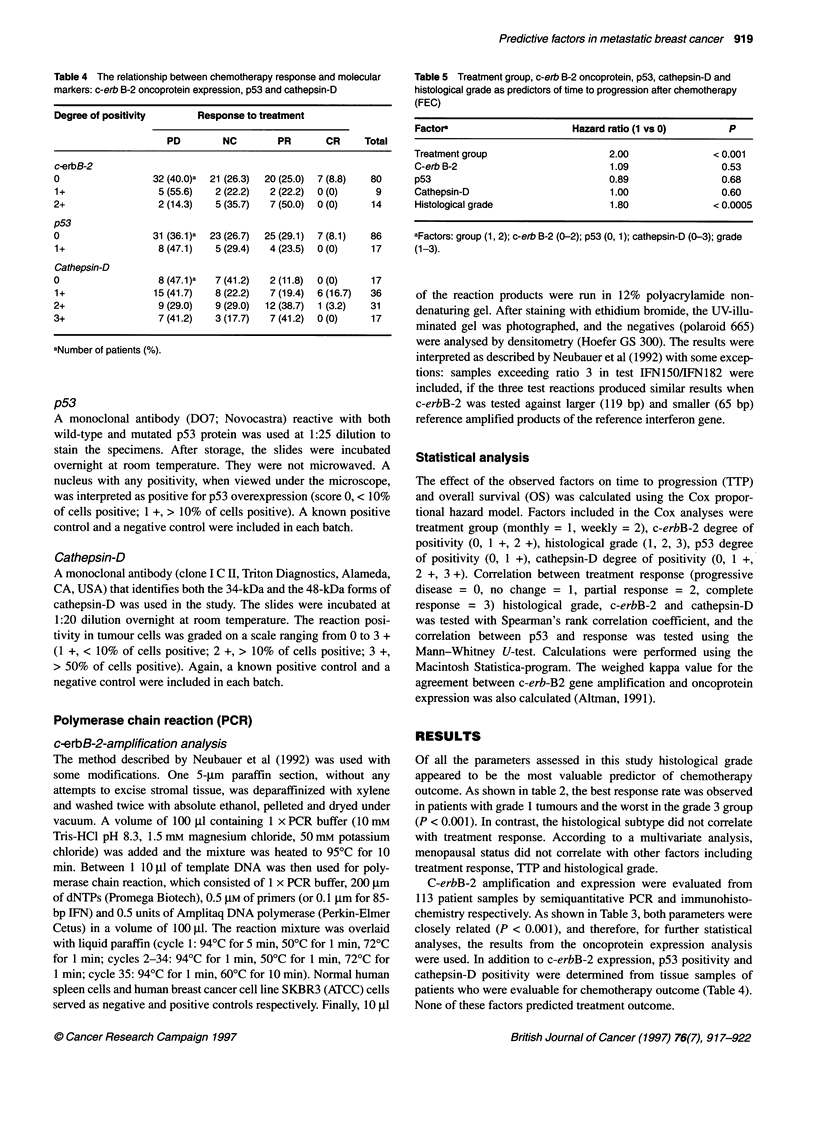
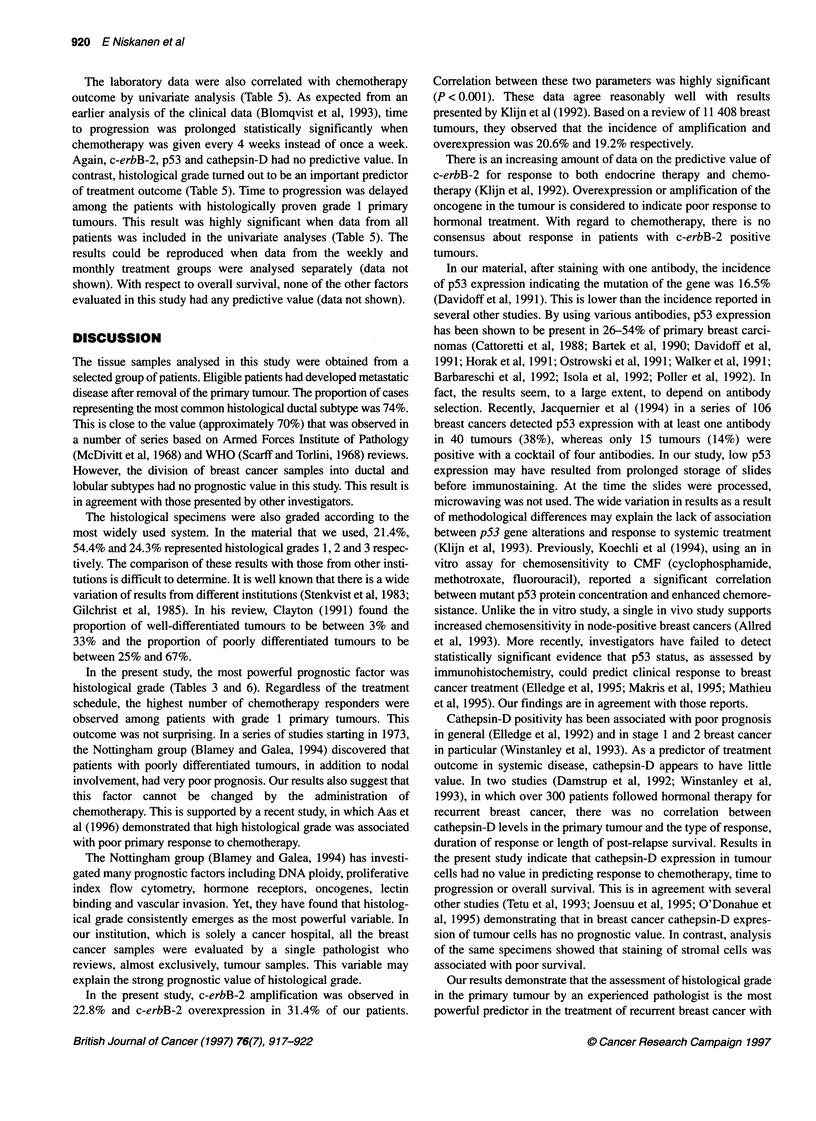
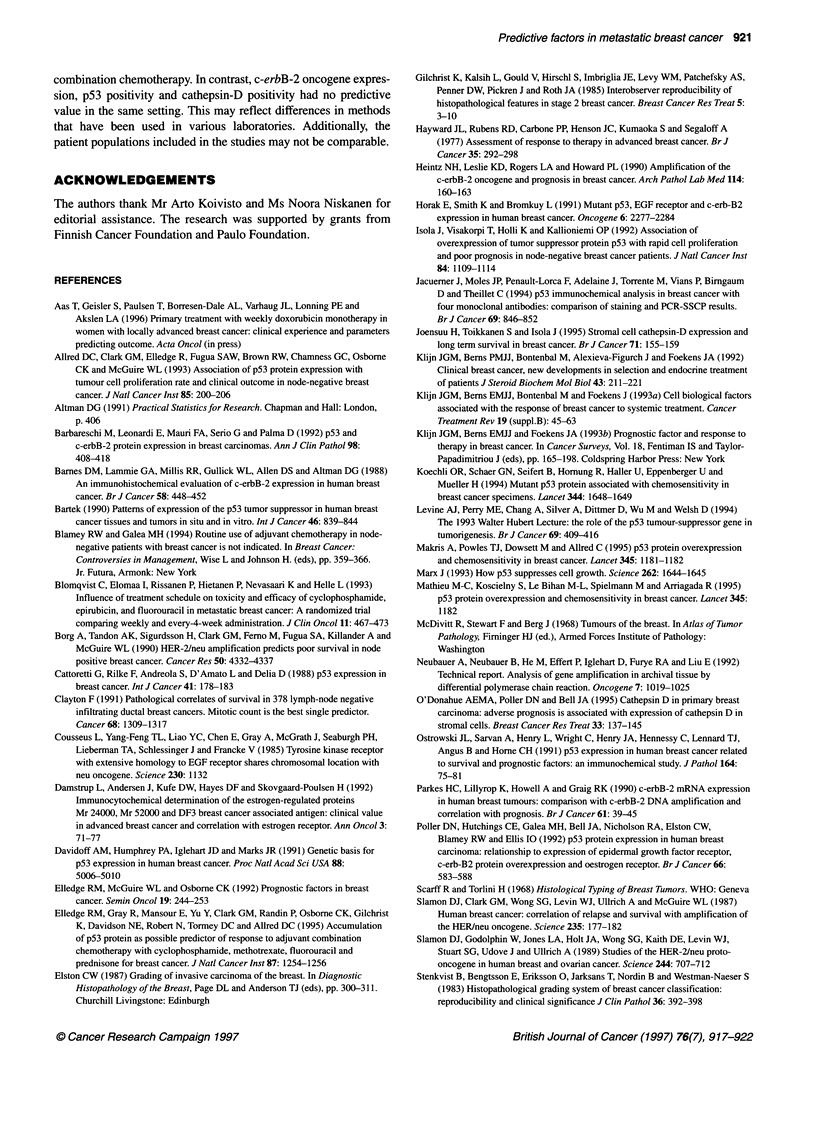
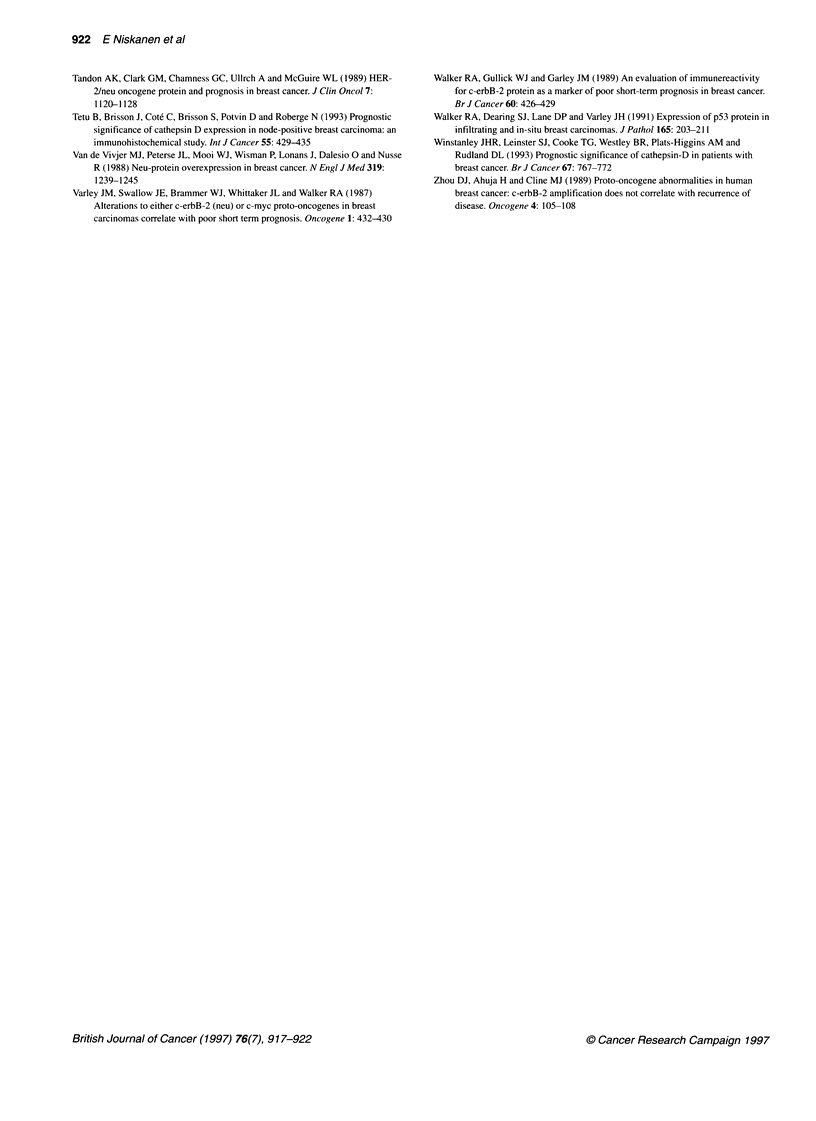
Selected References
These references are in PubMed. This may not be the complete list of references from this article.
- Allred D. C., Clark G. M., Elledge R., Fuqua S. A., Brown R. W., Chamness G. C., Osborne C. K., McGuire W. L. Association of p53 protein expression with tumor cell proliferation rate and clinical outcome in node-negative breast cancer. J Natl Cancer Inst. 1993 Feb 3;85(3):200–206. doi: 10.1093/jnci/85.3.200. [DOI] [PubMed] [Google Scholar]
- Barbareschi M., Leonardi E., Mauri F. A., Serio G., Dalla Palma P. p53 and c-erbB-2 protein expression in breast carcinomas. An immunohistochemical study including correlations with receptor status, proliferation markers, and clinical stage in human breast cancer. Am J Clin Pathol. 1992 Oct;98(4):408–418. doi: 10.1093/ajcp/98.4.408. [DOI] [PubMed] [Google Scholar]
- Barnes D. M., Lammie G. A., Millis R. R., Gullick W. L., Allen D. S., Altman D. G. An immunohistochemical evaluation of c-erbB-2 expression in human breast carcinoma. Br J Cancer. 1988 Oct;58(4):448–452. doi: 10.1038/bjc.1988.238. [DOI] [PMC free article] [PubMed] [Google Scholar]
- Blomqvist C., Elomaa I., Rissanen P., Hietanen P., Nevasaari K., Helle L. Influence of treatment schedule on toxicity and efficacy of cyclophosphamide, epirubicin, and fluorouracil in metastatic breast cancer: a randomized trial comparing weekly and every-4-week administration. J Clin Oncol. 1993 Mar;11(3):467–473. doi: 10.1200/JCO.1993.11.3.467. [DOI] [PubMed] [Google Scholar]
- Borg A., Tandon A. K., Sigurdsson H., Clark G. M., Fernö M., Fuqua S. A., Killander D., McGuire W. L. HER-2/neu amplification predicts poor survival in node-positive breast cancer. Cancer Res. 1990 Jul 15;50(14):4332–4337. [PubMed] [Google Scholar]
- Bártek J., Bártková J., Vojtesek B., Stasková Z., Rejthar A., Kovarík J., Lane D. P. Patterns of expression of the p53 tumour suppressor in human breast tissues and tumours in situ and in vitro. Int J Cancer. 1990 Nov 15;46(5):839–844. doi: 10.1002/ijc.2910460515. [DOI] [PubMed] [Google Scholar]
- Cattoretti G., Rilke F., Andreola S., D'Amato L., Delia D. P53 expression in breast cancer. Int J Cancer. 1988 Feb 15;41(2):178–183. doi: 10.1002/ijc.2910410204. [DOI] [PubMed] [Google Scholar]
- Clayton F. Pathologic correlates of survival in 378 lymph node-negative infiltrating ductal breast carcinomas. Mitotic count is the best single predictor. Cancer. 1991 Sep 15;68(6):1309–1317. doi: 10.1002/1097-0142(19910915)68:6<1309::aid-cncr2820680621>3.0.co;2-i. [DOI] [PubMed] [Google Scholar]
- Coussens L., Yang-Feng T. L., Liao Y. C., Chen E., Gray A., McGrath J., Seeburg P. H., Libermann T. A., Schlessinger J., Francke U. Tyrosine kinase receptor with extensive homology to EGF receptor shares chromosomal location with neu oncogene. Science. 1985 Dec 6;230(4730):1132–1139. doi: 10.1126/science.2999974. [DOI] [PubMed] [Google Scholar]
- Damstrup L., Andersen J., Kufe D. W., Hayes D. F., Poulsen H. S. Immunocytochemical determination of the estrogen-regulated proteins Mr 24,000, Mr 52,000 and DF3 breast cancer associated antigen: clinical value in advanced breast cancer and correlation with estrogen receptor. Ann Oncol. 1992 Jan;3(1):71–77. doi: 10.1093/oxfordjournals.annonc.a058078. [DOI] [PubMed] [Google Scholar]
- Davidoff A. M., Humphrey P. A., Iglehart J. D., Marks J. R. Genetic basis for p53 overexpression in human breast cancer. Proc Natl Acad Sci U S A. 1991 Jun 1;88(11):5006–5010. doi: 10.1073/pnas.88.11.5006. [DOI] [PMC free article] [PubMed] [Google Scholar]
- Elledge R. M., Gray R., Mansour E., Yu Y., Clark G. M., Ravdin P., Osborne C. K., Gilchrist K., Davidson N. E., Robert N. Accumulation of p53 protein as a possible predictor of response to adjuvant combination chemotherapy with cyclophosphamide, methotrexate, fluorouracil, and prednisone for breast cancer. J Natl Cancer Inst. 1995 Aug 16;87(16):1254–1256. doi: 10.1093/jnci/87.16.1254. [DOI] [PubMed] [Google Scholar]
- Elledge R. M., McGuire W. L., Osborne C. K. Prognostic factors in breast cancer. Semin Oncol. 1992 Jun;19(3):244–253. [PubMed] [Google Scholar]
- Gilchrist K. W., Kalish L., Gould V. E., Hirschl S., Imbriglia J. E., Levy W. M., Patchefsky A. S., Penner D. W., Pickren J., Roth J. A. Interobserver reproducibility of histopathological features in stage II breast cancer. An ECOG study. Breast Cancer Res Treat. 1985;5(1):3–10. doi: 10.1007/BF01807642. [DOI] [PubMed] [Google Scholar]
- Hayward J. L., Carbone P. P., Heusen J. C., Kumaoka S., Segaloff A., Rubens R. D. Assessment of response to therapy in advanced breast cancer. Br J Cancer. 1977 Mar;35(3):292–298. doi: 10.1038/bjc.1977.42. [DOI] [PMC free article] [PubMed] [Google Scholar]
- Heintz N. H., Leslie K. O., Rogers L. A., Howard P. L. Amplification of the c-erb B-2 oncogene and prognosis of breast adenocarcinoma. Arch Pathol Lab Med. 1990 Feb;114(2):160–163. [PubMed] [Google Scholar]
- Horak E., Smith K., Bromley L., LeJeune S., Greenall M., Lane D., Harris A. L. Mutant p53, EGF receptor and c-erbB-2 expression in human breast cancer. Oncogene. 1991 Dec;6(12):2277–2284. [PubMed] [Google Scholar]
- Isola J., Visakorpi T., Holli K., Kallioniemi O. P. Association of overexpression of tumor suppressor protein p53 with rapid cell proliferation and poor prognosis in node-negative breast cancer patients. J Natl Cancer Inst. 1992 Jul 15;84(14):1109–1114. doi: 10.1093/jnci/84.14.1109. [DOI] [PubMed] [Google Scholar]
- Jacquemier J., Molès J. P., Penault-Llorca F., Adélaide J., Torrente M., Viens P., Birnbaum D., Theillet C. p53 immunohistochemical analysis in breast cancer with four monoclonal antibodies: comparison of staining and PCR-SSCP results. Br J Cancer. 1994 May;69(5):846–852. doi: 10.1038/bjc.1994.164. [DOI] [PMC free article] [PubMed] [Google Scholar]
- Joensuu H., Toikkanen S., Isola J. Stromal cell cathepsin D expression and long-term survival in breast cancer. Br J Cancer. 1995 Jan;71(1):155–159. doi: 10.1038/bjc.1995.32. [DOI] [PMC free article] [PubMed] [Google Scholar]
- Klijn J. G., Berns E. M., Bontenbal M., Foekens J. Cell biological factors associated with the response of breast cancer to systemic treatment. Cancer Treat Rev. 1993 Apr;19 (Suppl B):45–63. doi: 10.1016/0305-7372(93)90007-e. [DOI] [PubMed] [Google Scholar]
- Klijn J. G., Berns E. M., Foekens J. A. Prognostic factors and response to therapy in breast cancer. Cancer Surv. 1993;18:165–198. [PubMed] [Google Scholar]
- Klijn J. G., Berns P. M., Bontenbal M., Alexieva-Figusch J., Foekens J. A. Clinical breast cancer, new developments in selection and endocrine treatment of patients. J Steroid Biochem Mol Biol. 1992 Sep;43(1-3):211–221. doi: 10.1016/0960-0760(92)90210-a. [DOI] [PubMed] [Google Scholar]
- Koechli O., Schaer G. N., Seifert B., Hornung R., Haller U., Eppenberger U., Mueller H. Mutant p53 protein associated with chemosensitivity in breast cancer specimens. Lancet. 1994 Dec 10;344(8937):1647–1648. doi: 10.1016/s0140-6736(94)90447-2. [DOI] [PubMed] [Google Scholar]
- Levine A. J., Perry M. E., Chang A., Silver A., Dittmer D., Wu M., Welsh D. The 1993 Walter Hubert Lecture: the role of the p53 tumour-suppressor gene in tumorigenesis. Br J Cancer. 1994 Mar;69(3):409–416. doi: 10.1038/bjc.1994.76. [DOI] [PMC free article] [PubMed] [Google Scholar]
- Makris A., Powles T. J., Dowsett M., Allred C. p53 protein overexpression and chemosensitivity in breast cancer. Lancet. 1995 May 6;345(8958):1181–1182. doi: 10.1016/s0140-6736(95)91014-x. [DOI] [PubMed] [Google Scholar]
- Marx J. How p53 suppresses cell growth. Science. 1993 Dec 10;262(5140):1644–1645. doi: 10.1126/science.8259506. [DOI] [PubMed] [Google Scholar]
- Mathieu M. C., Koscielny S., Le Bihan M. L., Spielmann M., Arriagada R. p53 protein overexpression and chemosensitivity in breast cancer. Institut Gustave-Roussy Breast Cancer Group. Lancet. 1995 May 6;345(8958):1182–1182. [PubMed] [Google Scholar]
- Neubauer A., Neubauer B., He M., Effert P., Iglehart D., Frye R. A., Liu E. Analysis of gene amplification in archival tissue by differential polymerase chain reaction. Oncogene. 1992 May;7(5):1019–1025. [PubMed] [Google Scholar]
- O'Donoghue A. E., Poller D. N., Bell J. A., Galea M. H., Elston C. W., Blamey R. W., Ellis I. O. Cathepsin D in primary breast carcinoma: adverse prognosis is associated with expression of cathepsin D in stromal cells. Breast Cancer Res Treat. 1995;33(2):137–145. doi: 10.1007/BF00682721. [DOI] [PubMed] [Google Scholar]
- Ostrowski J. L., Sawan A., Henry L., Wright C., Henry J. A., Hennessy C., Lennard T. J., Angus B., Horne C. H. p53 expression in human breast cancer related to survival and prognostic factors: an immunohistochemical study. J Pathol. 1991 May;164(1):75–81. doi: 10.1002/path.1711640113. [DOI] [PubMed] [Google Scholar]
- Parkes H. C., Lillycrop K., Howell A., Craig R. K. C-erbB2 mRNA expression in human breast tumours: comparison with c-erbB2 DNA amplification and correlation with prognosis. Br J Cancer. 1990 Jan;61(1):39–45. doi: 10.1038/bjc.1990.9. [DOI] [PMC free article] [PubMed] [Google Scholar]
- Poller D. N., Hutchings C. E., Galea M., Bell J. A., Nicholson R. A., Elston C. W., Blamey R. W., Ellis I. O. p53 protein expression in human breast carcinoma: relationship to expression of epidermal growth factor receptor, c-erbB-2 protein overexpression, and oestrogen receptor. Br J Cancer. 1992 Sep;66(3):583–588. doi: 10.1038/bjc.1992.318. [DOI] [PMC free article] [PubMed] [Google Scholar]
- Slamon D. J., Godolphin W., Jones L. A., Holt J. A., Wong S. G., Keith D. E., Levin W. J., Stuart S. G., Udove J., Ullrich A. Studies of the HER-2/neu proto-oncogene in human breast and ovarian cancer. Science. 1989 May 12;244(4905):707–712. doi: 10.1126/science.2470152. [DOI] [PubMed] [Google Scholar]
- Stenkvist B., Bengtsson E., Eriksson O., Jarkrans T., Nordin B., Westman-Naeser S. Histopathological systems of breast cancer classification: reproducibility and clinical significance. J Clin Pathol. 1983 Apr;36(4):392–398. doi: 10.1136/jcp.36.4.392. [DOI] [PMC free article] [PubMed] [Google Scholar]
- Tandon A. K., Clark G. M., Chamness G. C., Ullrich A., McGuire W. L. HER-2/neu oncogene protein and prognosis in breast cancer. J Clin Oncol. 1989 Aug;7(8):1120–1128. doi: 10.1200/JCO.1989.7.8.1120. [DOI] [PubMed] [Google Scholar]
- Têtu B., Brisson J., Côté C., Brisson S., Potvin D., Roberge N. Prognostic significance of cathepsin-D expression in node-positive breast carcinoma: an immunohistochemical study. Int J Cancer. 1993 Sep 30;55(3):429–435. doi: 10.1002/ijc.2910550318. [DOI] [PubMed] [Google Scholar]
- Varley J. M., Swallow J. E., Brammar W. J., Whittaker J. L., Walker R. A. Alterations to either c-erbB-2(neu) or c-myc proto-oncogenes in breast carcinomas correlate with poor short-term prognosis. Oncogene. 1987;1(4):423–430. [PubMed] [Google Scholar]
- Walker R. A., Dearing S. J., Lane D. P., Varley J. M. Expression of p53 protein in infiltrating and in-situ breast carcinomas. J Pathol. 1991 Nov;165(3):203–211. doi: 10.1002/path.1711650303. [DOI] [PubMed] [Google Scholar]
- Walker R. A., Gullick W. J., Varley J. M. An evaluation of immunoreactivity for c-erbB-2 protein as a marker of poor short-term prognosis in breast cancer. Br J Cancer. 1989 Sep;60(3):426–429. doi: 10.1038/bjc.1989.299. [DOI] [PMC free article] [PubMed] [Google Scholar]
- Winstanley J. H., Leinster S. J., Cooke T. G., Westley B. R., Platt-Higgins A. M., Rudland P. S. Prognostic significance of cathepsin-D in patients with breast cancer. Br J Cancer. 1993 Apr;67(4):767–772. doi: 10.1038/bjc.1993.139. [DOI] [PMC free article] [PubMed] [Google Scholar]
- Zhou D. J., Ahuja H., Cline M. J. Proto-oncogene abnormalities in human breast cancer: c-ERBB-2 amplification does not correlate with recurrence of disease. Oncogene. 1989 Jan;4(1):105–108. [PubMed] [Google Scholar]


